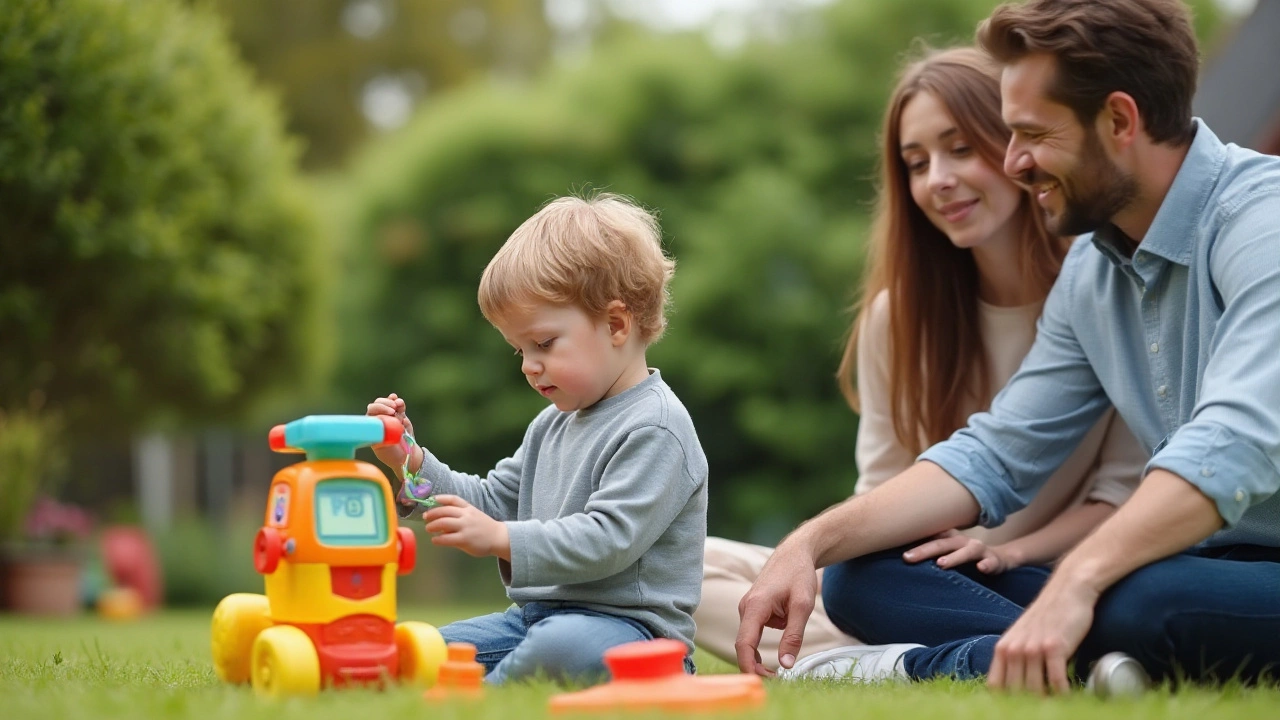Understanding ADHD Inheritance and the Role of Parental Genetics

Attention-Deficit/Hyperactivity Disorder (ADHD) is a condition that affects millions of children worldwide, and understanding why a child might develop this disorder often leads us into discussions of genetics. The question frequently arises: Is ADHD inherited from the mother or the father? While genetics plays a significant role, the answer isn't as clear-cut as it might seem.
Studies suggest that ADHD doesn't come from just one parent's side. Both maternal and paternal genetic contributions are important. Furthermore, environmental factors and family dynamics can't be overlooked. This makes ADHD a complex condition influenced by a versatile mix of heredity and upbringing.
There are ways to positively impact children diagnosed with ADHD, including the strategic use of educational toys. These toys can enhance concentration and offer a hands-on method to develop key learning skills. It's crucial for parents to recognize how inherited aspects can influence ADHD and what actionable steps can be taken to support their child's growth.
- ADHD and Its Genetic Roots
- Parental Influence: Maternal vs. Paternal Contribution
- Surprising Facts About ADHD Inheritance
- The Role of Environment in ADHD Development
- Educational Toys as a Supportive Tool
- Practical Tips for Parents
ADHD and Its Genetic Roots
ADHD has long intrigued researchers, primarily due to its pervasive impact on individuals and the possibility that it can be inherited. Scientific studies increasingly show that genetics plays a substantial role in the development of ADHD. Certain genes have been found to contribute to the disorder's emergence, alongside various environmental influences that may exacerbate or mitigate these genetic tendencies. Interestingly, research suggests that ADHD is highly heritable, implying that children of parents with ADHD are more likely to exhibit similar symptoms.
The genetic basis of ADHD often revolves around the dopamine transporter gene, which is known to affect neurotransmission in the brain, particularly in areas related to attention and behavior. This implies a biological underpinning to symptoms such as inattention, hyperactivity, and impulsiveness. Aside from dopamine, other neurotransmitter systems like norepinephrine and serotonin are also believed to be involved. Studies indicate that specific variations in the genes regulating these neurotransmitters contribute to the manifestation of ADHD.
Further complexity in understanding ADHD inheritance comes from its polygenic nature. The disorder doesn't arise from a single gene but rather from the interplay of multiple genetic factors. Twin studies have consistently shown high concordance rates, particularly in identical twins, lending strong support to the genetic hypothesis. In one noteworthy study, researchers pointed out that roughly 70-80% of ADHD variability we observe can be attributed to genetic factors.
Despite the strong genetic component, pinpointing the precise genetic mechanisms remains challenging. The presence of ADHD-associated genetic markers does not guarantee the development of the disorder, emphasizing the need to consider environmental factors. For instance, prenatal exposure to toxins or maternal stress can heighten the genetic predisposition of a child toward ADHD. Dr. Jillian Doyle, a well-regarded expert in the field, stated:
"While genetics lay the foundation, it is the interaction with the environment that truly shapes the individual expression of ADHD."
Understanding genetic roots provides critical insights into potential treatment approaches and developmental support for children with ADHD. By acknowledging the genetic predispositions, parents, caregivers, and educators can better tailor interventions. Educational toys designed with ADHD in mind can offer an accessible, playful method to help children hone their focus and build cognitive skills. By leveraging the potential of these toys, along with a supportive home and school environment, parents can help ease the challenges their children might face due to these inherited traits.
Parental Influence: Maternal vs. Paternal Contribution
When exploring the genetic influences on ADHD inheritance, both the mother's and father's roles are significant yet distinct. Genetic research indicates that ADHD is a highly heritable condition, meaning that if one parent has the disorder, there is a higher likelihood of their children also developing it. It’s estimated that genetics account for 70-80% of the risk of developing ADHD, highlighting how deeply rooted the condition is in family history. This leads to interesting questions about what specific roles mothers and fathers play in this complex picture.
Studies have shown that both parents can pass on ADHD-related genes, but the pathways may differ. Maternal genes are often associated with the transmission of emotional regulation traits and certain social behaviors linked to ADHD. On the other hand, paternal contributions might influence factors related to impulsivity and hyperactivity. While large-scale studies still seek to pinpoint specific genes and their sources, the inheritance pattern can sometimes depend on the presence of ADHD symptoms in either parent, as well as the manifestation of those symptoms.
This complexity is further accentuated by environmental factors, which can interact with genetic predispositions to influence the severity and type of ADHD symptoms. An interesting aspect here is the differential impact that parental lifestyles and behavioral patterns have on children. For example, if a father has ADHD and exhibits impulsive behavior, this can affect the household environment in ways that might accentuate ADHD symptoms in children beyond genetic predisposition. The dynamic between inherited genetics and daily experiences plays a crucial role in shaping how ADHD manifests from one child to another.
Parental influence is not solely about genetic inheritance but also how parents manage their condition if they have ADHD. Children often mirror behaviors they observe, which means a parent’s ability to manage their ADHD can directly affect their children’s approach to dealing with the condition. There’s an element of learned behavior that overlaps with purely genetic factors. Families with a history of ADHD might consider educational strategies and support systems to help navigate these challenges. These strategies can also include the use of educational toys tailored to bolster cognitive and social skills in children, addressing some inherited deficits through engaging play.
While genetics offers crucial insights, it's essential to recognize the intricate interplay between these inherited tendencies and environmental influences. With ongoing research, scientists are gradually unraveling more about specific genetic markers. In several studies, behaviors that align closely with ADHD have been observed more intensely in children whose fathers display similar attributes, compared to maternal influences. This doesn't diminish the importance of the mother’s role but instead highlights the unique, sometimes subtle ways both parents contribute to ADHD features.
"The reality of ADHD genetics is nuanced and multi-layered, often requiring personalized understanding and approaches. While we grasp at the precise markers and pathways, we understand that both parents play equally vital, albeit different, roles in conveying ADHD tendencies." – Dr. Emily Werner, Professor of Psychology.Understanding these dynamics not only helps in grasping the risk factors involved but also empowers parents to tailor their support and interventions effectively. Ultimately, a cohesive strategy that combines genetic understanding with proactive parenting can lead to better management and outcomes for children with ADHD.

Surprising Facts About ADHD Inheritance
When we talk about ADHD, it's common to hear about its genetic underpinnings, but what exactly does that mean? One might be surprised to learn that Attention-Deficit/Hyperactivity Disorder isn't transmitted through a single gene or even a set group of genes. Instead, it results from a complex interplay of multiple genetic influences. Scientists have identified various genetic variations associated with an increased risk for ADHD, but no singular "ADHD gene" exists. Most individuals with ADHD have a family history of the disorder, and studies suggest that this familial occurrence could be due to shared genetic components. It's fascinating to realize the intricate web of inherited traits, as unlike some diseases where a single genetic mutation is at play, ADHD's genetic landscape is like a puzzle with numerous pieces.
Both parents can contribute to the genetic makeup linked to ADHD, but research shows some interesting patterns. Twin and family studies indicate that genetic factors can explain a considerable portion of ADHD cases. Among twin studies, it was found that if one identical twin has ADHD, there is more than a 70% chance the other will too. This suggests a very high heritability rate, one of the highest among psychiatric disorders. The involvement of genes related to dopamine regulation is noteworthy here, as dopamine is a neurotransmitter significant in behavioral and attentional processes, highlighting an area where parental genetics collectively impact development. In many cases, it's a parent's attention to their own symptoms of ADHD that can shed new light on the child's behavior. Often, adults discover their own undiagnosed ADHD when their child is diagnosed, providing a retrospective insight into inherited traits.
"More than 50 percent of children with ADHD have a parent with the disorder," states Dr. Barkley, a well-known expert in the field. "Understanding the genetic link helps to demystify some family dynamics, guiding effective management strategies."
Another compelling fact to look at is the gender dynamics in ADHD inheritance. Historically, boys have been diagnosed with ADHD more frequently than girls, and this has led researchers to question the role gender plays in both the diagnosis and inherited traits. Recent studies reveal that while girls are less frequently diagnosed, they may go more undiagnosed, which can skew perceptions about inheritance patterns. Additionally, traits may express differently across genders, further influencing how ADHD functions within families. Mothers and fathers both pass on potential ADHD-related genes, which means that examining both sides of a child's heritage can offer clues to their condition. Schools and educators increasingly rely on this understanding for better accommodation and teaching strategies, aiding children to thrive academically despite their challenges.
The Role of Environment in ADHD Development
When discussing Attention-Deficit/Hyperactivity Disorder (ADHD), genetics often takes the spotlight. However, the environment in which a child is raised plays a significant role in the development and management of ADHD symptoms. While a child may have a genetic predisposition, certain environmental factors can either mitigate or exacerbate these tendencies. Recognizing and optimizing these factors can be instrumental in shaping a child's experience with ADHD.
Various studies have delved into how prenatal and early childhood environments affect the likelihood of developing ADHD. Maternal behaviors during pregnancy, such as smoking or alcohol consumption, have been linked to an increased risk factor for ADHD. Beyond the womb, early life experiences, including exposure to toxins like lead, pollution, or even food additives, are known contributors to the disorder's development. The neighborhood a child grows up in, access to nutritious foods, and safe play spaces can powerfully influence the emergence or mitigation of ADHD symptoms.
Moreover, familial environment and parenting styles are essential to this equation. Children thrive when they feel secure and supported. High levels of familial stress, inconsistent discipline, or lack of structure can provoke or intensify ADHD behaviors. On the other hand, supportive, organized, and communicative family settings encourage better focus and behavioral management in children predisposed to ADHD. Warm, attentive parenting alongside a structured daily routine can greatly aid a child in managing their symptoms.
"It's pivotal to understand that ADHD is not merely the consequence of inadequate parenting or environmental pressures alone. However, these factors can influence the severity and manifestation of the disorder," asserts Dr. Vivienne Russell, a renowned child psychologist.
In addition to parenting styles, educational environments significantly impact children with ADHD. Schools that offer individualized support, flexible learning environments, and incorporate engaging educational tools watch their students succeed far beyond traditional academic settings. Greater awareness and adaptation within the school system can provide critical support for children with ADHD, helping them to achieve their full potential. Teachers trained to provide such support can make a huge difference in helping students stay focused and succeed academically.
Beyond the basics of home and school, societal and cultural influences continue to play a part in a child's development with ADHD. Societies valuing intense academic pressure without space for individual learning differences might fail to nurture children with ADHD adequately. Conversely, acknowledging and fostering diverse learning styles within communities promotes a more inclusive environment, benefitting all, especially those with ADHD. Communities that understand the unique needs and contributions of individuals with ADHD not only see better educational and developmental outcomes but also enrich the society as a whole.
Ultimately, understanding the interplay between genetic predispositions and environmental factors provides a more comprehensive approach to addressing ADHD. By focusing on optimizing the environment—both home and school—parents and educators can offer a supportive framework where children with ADHD can truly thrive. This approach not only nurtures individuals with ADHD but also fosters empathy and understanding across society.

Educational Toys as a Supportive Tool
In recent years, a growing emphasis has been placed on the use of educational toys to support children with ADHD. These toys are not just fun; they are thoughtfully designed tools that can aid in various aspects of child development. For parents seeking ways to channel their children’s abundant energy constructively, the right toy can make all the difference. The benefits are evident with educational toys offering both cognitive engagement and physical activity, which are crucial for children with ADHD.
One popular type of educational toy is fidget spinners and cubes. These toys offer a way for kids to let out nervous energy and focus on their tasks. By occupying their hands, children often find it easier to concentrate on mental tasks. Beyond fidget tools, construction sets like LEGO or magnetic building blocks play an essential role in developing problem-solving skills and spatial awareness. They encourage children to think creatively and work systematically to create their designs, something that can benefit ADHD kids immensely.
Another important aspect of educational toys is their ability to enhance social skills. Board games and cooperative play sets require children to interact with peers, follow rules, and practice patience and turn-taking. These interactions are the foundation of social skill development in kids with ADHD, who might typically struggle in such areas. A recent report suggested,
"Children engaged in play with educational toys demonstrated better social negotiation skills compared to those involved in unstructured play."This highlights the tangible benefits these toys can offer in various developmental domains.
Of course, it’s not just about the toys themselves; it’s about how they’re used. Parents can turn learning into a playful experience by involving children in choosing and using educational toys. This engagement gives kids a sense of ownership and motivation. Educational toys like interactive puzzles and electronic toys that teach numbers, letters, or science concepts are also invaluable. They provide structured yet exciting learning experiences that can hold a child’s attention for extended periods.
Moreover, there are toys specifically engineered to calm children and help them focus. Sensory-friendly toys like kinetic sand or squishy stress balls allow children to explore different textures and sensations, which can be both soothing and stimulating. Including these kinds of toys as part of a daily routine can help children with ADHD manage feelings of restlessness or anxiety that might otherwise distract them from schoolwork or other activities.
Thus, choosing educational toys is not just an entertaining option; it's vital for development. Parents and educators have found success using these tools to create structured environments that encourage learning. Whether it's building blocks or games that require strategy and collaboration, these tools have proven benefits that reach far beyond playtime. As research continues to explore how parental genetics influence ADHD, incorporating these tools into daily routines provides children with the much-needed support to thrive.
Practical Tips for Parents
As a parent navigating the world of ADHD, understanding the unique needs of your child can indeed feel like a journey. One vital aspect is communication. It's essential to keep an open dialogue with your child to understand how they perceive the world and what challenges they face in their daily life. Encourage them to express their thoughts and feelings, and ensure they know you're there to support them. This approach not only strengthens your relationship but also empowers them to develop self-awareness and self-advocacy skills. Critically, children with ADHD often benefit from structured environments, so creating a consistent daily routine that aligns with their comfort levels can have a significant impact. It's helpful to have clear expectations and regular schedules that minimize surprises and reduce stress.
Moreover, employing educational toys is an excellent way to channel your child's energy positively. Toys designed to improve concentration and teach patience can be especially helpful. Interactive games that promote strategic thinking and problem-solving are not just fun, but they also encourage cognitive development, providing a balance between learning and play. It's essential to choose toys that match your child's interests while also introducing new concepts and skills gradually. Believe it or not, ordinary play can significantly contribute to managing ADHD symptoms effectively when done with intention and mindfulness.
Effective organization skills are another area where parents can offer support. Help your child learn to prioritize tasks by breaking them down into smaller, manageable steps. This can be particularly useful in their academic life, where tasks can often feel overwhelming. Simple tools like visual planners or task charts can aid in this regard, assisting your child in focusing on one task at a time and achieving a sense of accomplishment with each completed step. Encourage the use of timers during activities as this can help children learn time management, a skill that becomes increasingly vital as they grow older.
Also, don't forget the importance of supporting a healthy lifestyle. Ensure your child has a balanced diet with omega-3 fatty acids, fresh fruits, and vegetables, which are known to support brain health. Regular physical activity is equally important and can help reduce excess energy, improving concentration and mood. Encourage activities that your child enjoys, whether it's dancing, swimming, or cycling. It might also inspire competitive spirit while simultaneously burning off some of those vibrant energy reserves that ADHD kids are known for.
Involve educators in your support network; they’re allies in your child's educational journey. Inform teachers about your child’s needs and work together to implement strategies to support your child's learning in class. Various accommodations like extra time on tests or being seated in a quieter area can make a world of difference. In fact, a 2006 study published in the Journal of Attention Disorders by Dr. Russell A. Barkley highlights how collaborative home-school relationships can significantly enhance academic outcomes for children with ADHD.
"Parents and teachers need to forge a collaborative partnership focusing on shared goals and strategies tailored to the child's unique strengths and challenges," Dr. Barkley suggests.
Lastly, remember to take care of yourself too. Parenting a child with ADHD can be demanding, and maintaining your well-being is crucial for providing the best support. Seek out support groups where you can share experiences and solutions with other parents. Not only does this provide a valuable source of information, but it also reminds you that you're not alone in this journey. Whenever necessary, don't hesitate to consult with psychologists or ADHD specialists for professional guidance tailored to your specific situation.


